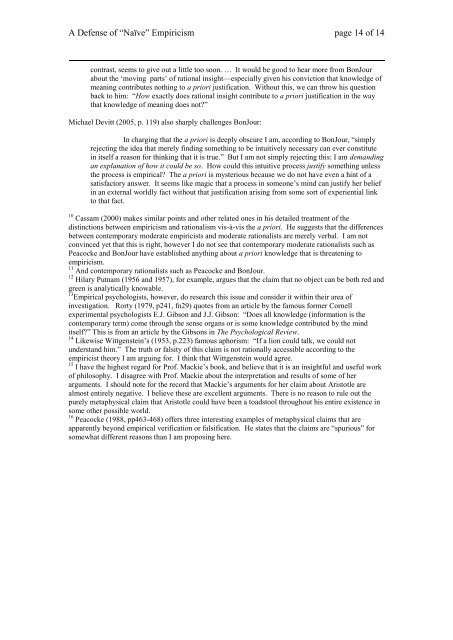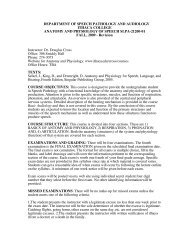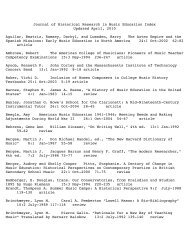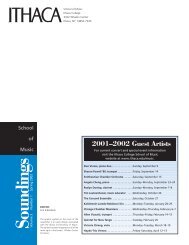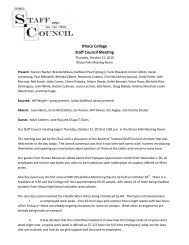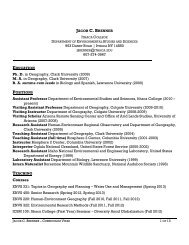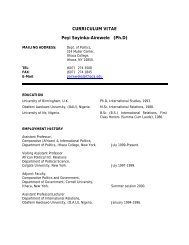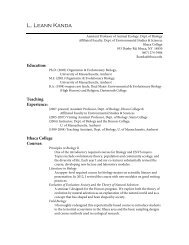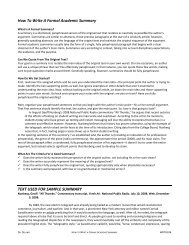A Brief Defense of Empiricism - Ithaca College
A Brief Defense of Empiricism - Ithaca College
A Brief Defense of Empiricism - Ithaca College
Create successful ePaper yourself
Turn your PDF publications into a flip-book with our unique Google optimized e-Paper software.
A <strong>Defense</strong> <strong>of</strong> “Naïve” <strong>Empiricism</strong> page 14 <strong>of</strong> 14<br />
contrast, seems to give out a little too soon. … It would be good to hear more from BonJour<br />
about the „moving parts‟ <strong>of</strong> rational insight—especially given his conviction that knowledge <strong>of</strong><br />
meaning contributes nothing to a priori justification. Without this, we can throw his question<br />
back to him: “How exactly does rational insight contribute to a priori justification in the way<br />
that knowledge <strong>of</strong> meaning does not?”<br />
Michael Devitt (2005, p. 119) also sharply challenges BonJour:<br />
In charging that the a priori is deeply obscure I am, according to BonJour, “simply<br />
rejecting the idea that merely finding something to be intuitively necessary can ever constitute<br />
in itself a reason for thinking that it is true.” But I am not simply rejecting this: I am demanding<br />
an explanation <strong>of</strong> how it could be so. How could this intuitive process justify something unless<br />
the process is empirical? The a priori is mysterious because we do not have even a hint <strong>of</strong> a<br />
satisfactory answer. It seems like magic that a process in someone‟s mind can justify her belief<br />
in an external worldly fact without that justification arising from some sort <strong>of</strong> experiential link<br />
to that fact.<br />
10 Cassam (2000) makes similar points and other related ones in his detailed treatment <strong>of</strong> the<br />
distinctions between empiricism and rationalism vis-à-vis the a priori. He suggests that the differences<br />
between contemporary moderate empiricists and moderate rationalists are merely verbal. I am not<br />
convinced yet that this is right, however I do not see that contemporary moderate rationalists such as<br />
Peacocke and BonJour have established anything about a priori knowledge that is threatening to<br />
empiricism.<br />
11 And contemporary rationalists such as Peacocke and BonJour.<br />
12 Hilary Putnam (1956 and 1957), for example, argues that the claim that no object can be both red and<br />
green is analytically knowable.<br />
13 Empirical psychologists, however, do research this issue and consider it within their area <strong>of</strong><br />
investigation. Rorty (1979, p241, fn29) quotes from an article by the famous former Cornell<br />
experimental psychologists E.J. Gibson and J.J. Gibson: “Does all knowledge (information is the<br />
contemporary term) come through the sense organs or is some knowledge contributed by the mind<br />
itself?” This is from an article by the Gibsons in The Psychological Review.<br />
14 Likewise Wittgenstein‟s (1953, p.223) famous aphorism: “If a lion could talk, we could not<br />
understand him.” The truth or falsity <strong>of</strong> this claim is not rationally accessible according to the<br />
empiricist theory I am arguing for. I think that Wittgenstein would agree.<br />
15 I have the highest regard for Pr<strong>of</strong>. Mackie‟s book, and believe that it is an insightful and useful work<br />
<strong>of</strong> philosophy. I disagree with Pr<strong>of</strong>. Mackie about the interpretation and results <strong>of</strong> some <strong>of</strong> her<br />
arguments. I should note for the record that Mackie‟s arguments for her claim about Aristotle are<br />
almost entirely negative. I believe these are excellent arguments. There is no reason to rule out the<br />
purely metaphysical claim that Aristotle could have been a toadstool throughout his entire existence in<br />
some other possible world.<br />
16 Peacocke (1988, pp463-468) <strong>of</strong>fers three interesting examples <strong>of</strong> metaphysical claims that are<br />
apparently beyond empirical verification or falsification. He states that the claims are “spurious” for<br />
somewhat different reasons than I am proposing here.


